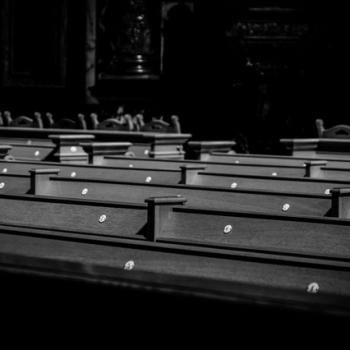 Hot dogs can preach. True story.
Hot dogs can preach. True story.
There’s a place on Main Street in London Kentucky—less than a block from First Christian Church—called Weaver’s Hot dogs. Lovingly referred to by locals as “Drew’s,” it started when the Weaver family bought the local pool hall in 1940 and started serving chili dogs… with chili made in the family home and carried to the place each morning. Over the years it evolved into a restaurant, the kind of place that has “regulars” and “a breakfast crowd”—meaning the retired guys who still rose early after years of hard work and service, and got together in the corner booth for eggs and bacon and coffee… 70 years of town and family history, documented in pictures and news clippings cover the walls. The smell of chili and fresh bread infused the air on that corner, making it nearly impossible to walk by there around lunchtime without stopping in. It’s where you went after school for a snack. (or during school if you were skipping school), for lunch. For my brother and I, it was the first place we took our future spouses when we brought them home to meet mom for the first time. [one of those future spouses said that it was not as good as his hot dog place in Owensboro. One of those future spouses is lucky that one of us married him anyway…]
This past Friday, news began to spread quickly on Facebook that Weaver’s would be closing its doors that same weekend. Without fanfare or ceremony, they welcomed a rather large and heartbroken Saturday lunch crowd, and served their last hot dogs. To many of us who live far away, it seems hard to believe that the heart of downtown can continue to beat without it.
If I think that the mainstreet of my childhood is unrecognizable today, that sense of vertigo is nothing alongside the changed landscape of Joplin, MO. There was a great column in the Times about the town’s “inner GPS” being out of whack, with all the familiar landmarks gone. Here is the link, and it’s worth reading in full: http://www.nytimes.com/2011/05/29/us/29joplin.html
I don’t mean to make a sweeping comparison between downtown London and downtown Joplin. One of these landscapes is being transformed–like so much of mainsteet America–by a shift in culture, a struggling economy, and changing demographics. The other was devastated by an act of nature. [Which–just so we’re clear–was NOT the wrath of an angry God who is pissed about U.S. foreign policy in Israel. Are you freakin kidding me, Christian Right?] One brings a sense of shared, communal melancholy, while the other has wrought unspeakable heartbreak, loss of life and suffering.
But the good news of one place speaks to the other. In the foundation of what remains, the heart of community does, in fact, continue to beat, even when our beloved “places” no longer have 4 walls around them. In moments of singular loss or utter devastation, we are reminded of God’s nature—certain, unchanging love–that remains, alive and moving in our midst.
Nowhere has that love been embodied so profoundly as in Joplin this past week. Supplies, volunteers and resources continue to poor in like liquid love. People of faith gather in prayer, committing to “mourn with those who mourn,” and share the burden of sorrow, even if no words can adequately express its depth. In community, we find ourselves centered in local places of gathering and shared history–but community also springs from the loss of these places.
As i mourned a beloved place of my own this past week, I was made to remember every other corner of town that has given me a sense of place. I took an inventory of every home and family that somehow made me the person i am today, half the world (or at least continent) away. I mentally walked myself into the sanctuary of the church where I learned the language of faith, and all of its many sacred expressions.
I’m sure that every person who has ever called Joplin home is there right now–whether in person or in spirit. Every person who has ever felt connection to that place is taking a sacred inventory of every home, person, family or gathering place that gave life to community; that shaped young people for the world; that made one little town not just a place on the map, but a beating heart with a life-giving rhythm.
I don’t live in Joplin. I’ve never visited. I didn’t lose a loved one to the storm. But I’m visiting my own lost places this week, in simple solidarity. What are your “lost” places? Where did they go, and what is left of them? How do you embody the grace and sense of belonging that you received there?
I believe that many of us still carry a little bit of Weaver’s good news with us today. Not just in the inches that it added to our waistlines, but in the gospel of gathered community and shared history that it bore on our hearts.
When the world around us is rendered suddenly unrecognizable–that is not when God shows up. That is when, for a moment, we see how real that sacred presence has been all along. Wherever people gather to share meals; to give what they have; to share the burden of sadness; to mourn what has been lost and see what might be built in its place; there is hope. Life is found in the beating heart of community. Shared memory calls forth remembered joy, adding a bearable note to the funeral song. Even when the collective heart is broken, there is no grief that its rhythm cannot bear.












